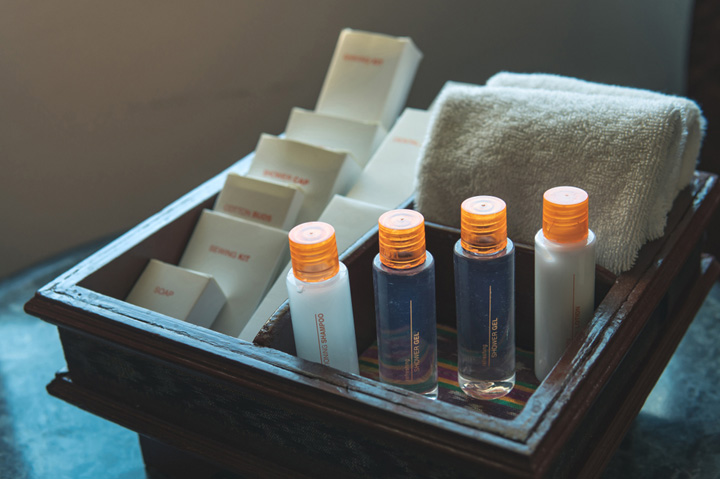July 16, 2024
New York’s ‘Small Bottle’ Ban Could Present Opportunity for Promo & Print Firms
New York is prohibiting small toiletry bottles in hotel rooms beginning in 2025, creating an opportunity for larger-bottle orders, or even entirely different designs for single-use products with special packaging.
Beginning on Jan. 1, 2025, New York will prohibit hotels with more than 50 rooms from giving out small bottles of toiletries like shampoo, conditioner and lotion. The law will impact smaller hotels in 2026.
As of now, the only other state with similar legislation is California, but Washington isn’t far behind, with its own forthcoming regulations aimed at phasing out the plastic toiletry bottles by 2027.

In the Empire State, the ban is part of a wider effort to limit plastic waste. Hotels that don’t adhere to the rule will have to pay $250 for initial violations and $500 for each subsequent infraction. All of the money raised from fines will go toward New York’s Environmental Protection Fund, according to the The New York Times.
The bill was originally introduced in 2019 and signed into law by Gov. Kathy Hochul in 2021. Implementation was delayed to give hotels time to go through their existing stock of branded toiletry bottles.
Promo Impacts
Miniature and travel-sized toiletries bottles and labels are popular in the promotional products industry. Personal care kits and wellness gifts commonly include items like lotions, bodywash, sunscreen and hair care products.
However, suppliers in the space aren’t overly concerned that New York’s legislation will affect their business or that of their distributor partners.
Kate Nash, director of promotional sales and marketing for supplier Raining Rose (asi/80489), says that while they do keep track of legislation like this, the hotel amenities sector doesn’t have margins to make it worth the work on the promo side, unless your company has its own manufacturing facility that specializes in that type of product, she says.
If anything, Nash believes that this legislation could present opportunities for promotional products distributors now that hotels might be in the market for larger-bottle toiletry items.
“Our promotional business does sell 1 [and] 1.5 oz. products for promotional use – lotion, hand sanitizer and sunscreen, which could be used for guest gifts – and our contract manufacturing division works in larger fill sizes,” she says. “The legislation could actually have a positive impact on our business if more hotel brands and amenities companies need partners who can develop products and fill larger sizes for them.”
Paul Christensen, president of supplier Natural Trends (asi/73497), agrees that the “small bottle” market in hotels is largely dominated by a different supply channel, rather than promo.
“It’s highly developed and has no room or need for a promo distributor in the middle of it, except when supplying higher-end or unique gift or spa sets,” Christensen says.
“The legislation could actually have a positive impact on our business if more hotel brands and amenities companies need partners who can develop products and fill larger sizes for them.” Kate Nash, Raining Rose (asi/80489)
If the outcome of this legislation is more business opportunities for larger toiletry items or different branded items to make up for the lost logo placement from miniature bottles, then distributors and suppliers could potentially generate more bank, more broadly, especially if other states follow New York and California’s lead, executives said.
Other environmentally focused legislation has impacted manufacturing and promotional products, like the current wave of states enacting laws banning PFAS chemicals commonly used on packaging and in apparel and the single-use plastic bag bans that have boosted tote bag sales for some industry firms.
“New York is the size of many countries, so New York’s role is watched,” Steven Englebright, a former state assemblyman and current Suffolk County, NY, legislator, tells The New York Times. “When we do something important, it has the potential to be looked at as a model for our sister states.”
Nash says Raining Rose is keeping an eye on how that dynamic could impact the hospitality sector across the nation.
“In the past several years, we have noticed states becoming increasingly bolder with legislation,” she says. “We do not expect this trend to fade. We already work to minimize the use of plastic in our process: We do not pack in single-use bags, and we use water-soluble packing tape and paper box filler. We are also working to replace our components with higher PCR-based resins. As we see these trends evolve, we will continue to do this work because it aligns with our values and with the business climate we see ahead.”
Print & Packaging Perspective
There is sales potential in the New York legislation for companies that operate in the print and packaging space, too. For one thing, there might be business in creating labels for the larger bottles that hospitality end-clients could need.
And then there’s this to consider, too: The New York Times reported that John Fitzpatrick of the Fitzpatrick Hotel Group is contemplating using individual packages of items like shampoo and conditioner. Think ketchup packets, but full of soap.
While these could be difficult to open with wet hands, it’s a potential solution that packaging pros could provide – not just for Fitzpatrick Hotel Group but for other hotel entities as well. Even if that’s not the precise packaging solution that proves best, Fitzpatrick and other hoteliers are open to new ideas, which could come from print/packaging pros.
“You know, I thought companies would be coming in with plenty of new ideas,” Fitzpatrick told the Times. “But here we are sitting around the table.”

Promo for the Planet is your destination for the latest news, biggest trends and best ideas to help build a more sustainable and socially-responsible industry.
